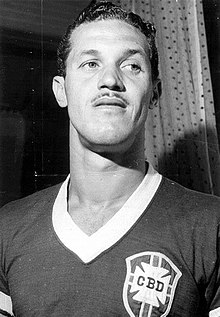
Summary
Ademir Marques de Menezes (Portuguese pronunciation: [adeˈmiʁ]; 8 November 1922 – 11 May 1996) was a Brazilian footballer, regarded as one of the best forwards in football history.[1] His prominent underbite earned him the nickname "Queixada", which means "jaw". He was also the top goalscorer in the 1950 FIFA World Cup.
 Ademir in 1947 | ||||||||||||||||||||||||||||||||||||||
| Personal information | ||||||||||||||||||||||||||||||||||||||
|---|---|---|---|---|---|---|---|---|---|---|---|---|---|---|---|---|---|---|---|---|---|---|---|---|---|---|---|---|---|---|---|---|---|---|---|---|---|---|
| Full name | Ademir Marques de Menezes | |||||||||||||||||||||||||||||||||||||
| Date of birth | 8 November 1922 | |||||||||||||||||||||||||||||||||||||
| Place of birth | Recife, Brazil | |||||||||||||||||||||||||||||||||||||
| Date of death | 11 May 1996 (aged 73) | |||||||||||||||||||||||||||||||||||||
| Place of death | Rio de Janeiro, Brazil | |||||||||||||||||||||||||||||||||||||
| Height | 1.76 m (5 ft 9 in) | |||||||||||||||||||||||||||||||||||||
| Position(s) | Striker | |||||||||||||||||||||||||||||||||||||
| Youth career | ||||||||||||||||||||||||||||||||||||||
| Sport Recife | ||||||||||||||||||||||||||||||||||||||
| Senior career* | ||||||||||||||||||||||||||||||||||||||
| Years | Team | Apps | (Gls) | |||||||||||||||||||||||||||||||||||
| 1939–1942 | Sport Recife | |||||||||||||||||||||||||||||||||||||
| 1942–1945 | Vasco da Gama | |||||||||||||||||||||||||||||||||||||
| 1946–1947 | Fluminense | |||||||||||||||||||||||||||||||||||||
| 1948–1956 | Vasco da Gama | |||||||||||||||||||||||||||||||||||||
| 1957 | Sport Recife | |||||||||||||||||||||||||||||||||||||
| International career | ||||||||||||||||||||||||||||||||||||||
| 1945–1953 | Brazil | 39 | (32) | |||||||||||||||||||||||||||||||||||
| Managerial career | ||||||||||||||||||||||||||||||||||||||
| 1967 | Vasco da Gama | |||||||||||||||||||||||||||||||||||||
Medal record
| ||||||||||||||||||||||||||||||||||||||
| *Club domestic league appearances and goals | ||||||||||||||||||||||||||||||||||||||
Club career edit
Ademir began his club career with Sport Recife before moving to Vasco da Gama. He played for Vasco for two spells, 1942–1945 and 1948–56, broken by a spell at Fluminense. In total, Ademir won two Pernambuco State League Championships (1941, 1942) and five Rio State League championships (1945, 1949, 1950, 1952, 1956). He won another with Fluminense (1946). He was the league's top scorer in 1949 with 30 goals and again in 1950 with 25 goals. Ademir finally retired from playing in 1956, going on to work as a commentator, coach and businessman.
International career edit
Ademir is best known for his exploits in the 1950 World Cup held in his native Brazil. Playing in an outstanding forward trio involving Zizinho and Jair he won the Golden Boot as the top scorer in the competition with 9 goals, and he also helped the team with 6 assists in the tournament. He was the scorer of the first competitive goal at the Maracanã stadium.[2] Despite this feat, he could not bring victory to Brazil in the decisive match against Uruguay – a national tragedy which was later dubbed the Maracanazo.
Ademir also enjoyed success in the Copa América. He played in the 1945, 1946, 1949, and 1953 editions of the tournament, with 13 goals and 3 assists in 18 appearances in the competition, including a tournament-winning hat-trick in the final play-off against Paraguay in 1949. He also won the Panamerican Championship with Brazil in 1952 scoring two goals on the title match against Chile. In total, Ademir played 39 times for his country, scoring 32 goals (according to RSSSF) between 1945 and 1953.
Style of play edit
A fast and powerful striker, with a strong shot in both feet,[1] Ademir began his career as a left winger before moving to the centre, causing havoc in opposing defences with his skill and sublime finishing. People at the time considered him an unequalled ball juggler who knew every trick in the book. He used to wreak havoc among defences with his quick changes in tempo, fooling his opponents with deceptions carried out almost at lightning speed, his mastering of the ball in all situations and the ability to accelerate rapidly.
Career statistics edit
International edit
| Brazil national team | ||
|---|---|---|
| Year | Apps | Goals |
| 1945 | 9 | 7 |
| 1946 | 6 | 1 |
| 1947 | 2 | 0 |
| 1948 | 0 | 0 |
| 1949 | 5 | 7 |
| 1950 | 9 | 14 |
| 1951 | 0 | 0 |
| 1952 | 5 | 2 |
| 1953 | 3 | 1 |
| Total | 39 | 32 |
Honours edit
Sport Recife
- Campeonato Pernambucano: 1941, 1942
Vasco da Gama
- Campeonato Carioca: 1945, 1949, 1950, 1952, 1956
- South American Championship of Champions: 1948
- Torneio Octogonal Rivadavia Correa Meyer: 1953
Fluminense
- Campeonato Carioca: 1946
Rio de Janeiro State Team
- Campeonato Brasileiro de Seleções Estaduais: 1943, 1944
Brazil
- South American Championship: 1949
- Panamerican Championship: 1952
- FIFA World Cup runner-up: 1950
- South American Championship runner-up: 1945, 1946, 1953
Individual
References edit
- ^ a b Tim Vickery (26 March 2007). "Tim Vickery column". BBC. Archived from the original on 30 March 2007. Retrieved 26 March 2007.
- ^ "Maracanã, the largest stadium of the world". Sambafoot.com. 28 November 2005. Archived from the original on 21 March 2007. Retrieved 23 March 2007.
- ^ Ademir de Menezes at National-Football-Teams.com
- ^ "Ademir Marques de Menezes - Goals in International Matches". Archived from the original on 8 February 2011. Retrieved 11 August 2010.
- ^ a b IFFHS' Century Elections


